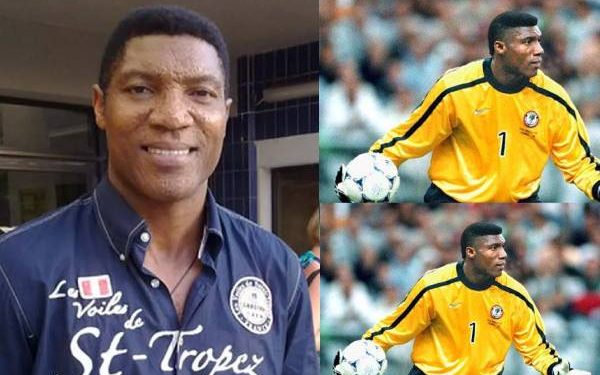By James Aduku Odaudu, PhD
In recent days, the global football community has been united in mourning the tragic passing of Liverpool star Diogo Jota. Tributes have poured in from across the world—teammates laying wreaths, fans holding candlelight vigils, club management releasing elaborate statements celebrating his legacy. Social media platforms are awash with heartfelt messages, video compilations of his goals and assists, and solemn reflections on how his life touched millions.
Yet, on the African continent, particularly in Nigeria, a parallel story unfolds—one that underscores an enduring national malaise: our collective disregard for our own heroes.
Nigeria’s former Super Eagles goalkeeper, Peter Rufai, fondly nicknamed Dodo Mayana, also passed away recently. Unlike the global outpouring of grief for Jota, Rufai’s death has hardly made a ripple beyond a few perfunctory headlines. No official national day of mourning, no dedicated memorial games, no unified show of respect. In fact, even before his death, reports revealed that Rufai had been largely abandoned in his prolonged illness, relying on a few benevolent friends and family members rather than the country he once served with distinction.
This contrast is more than a sad coincidence. It is symptomatic of why Nigerian sportsmen and women increasingly question their commitment to national service and representation.
Two Deaths, Two Different Reactions
Diogo Jota: A Death Mourned with Honour –
Jota’s passing triggered a robust institutional response. Liverpool FC, the English Premier League, UEFA, and the Portuguese Football Federation each released statements highlighting not only his professional feats but also his humanity. Fellow players wore black armbands. Stadiums observed a minute’s silence. His family was assured of lifelong support, and conversations began immediately about establishing a foundation in his memory.
This isn’t just about sentimentality; it’s an established culture of respect. In countries like England, Spain, Germany, and Portugal, sport is more than entertainment—it is a pillar of national pride. Therefore, when an icon falls, they are honoured with dignity and gratitude, setting an example for future generations that their sacrifice will never be in vain.
Peter Rufai: A Death Met with Silence
Contrast that to Rufai’s final days. The man who captained the Super Eagles to glory and inspired countless young Nigerians into football was left in relative obscurity. Apart from some individual tributes from former teammates and a sprinkling of mentions in the local press, official recognition was muted. He died as he lived the latter part of his life: neglected by the institutions he helped elevate.
This is not the first time a Nigerian sports legend has suffered such a fate. Stephen Keshi, Rashidi Yekini, Samuel Okwaraji—so many of Nigeria’s greats have died in penury, anonymity, or indignity.
Why Nigeria’s Sportsmen Struggle to Be Committed
The reasons behind this persistent abandonment are layered:
- Absence of Structured Welfare – In countries with robust sports governance, athletes enjoy insurance, pension schemes, and post-retirement support. Nigeria lacks a comprehensive welfare mechanism to protect athletes when the glory fades. It is an environment where sports heroes are treated as disposable assets.
- Short-term National Gratitude –
Nigerian institutions often celebrate sporting success in the heat of the moment—lavish dinners, cash gifts, and front-page newspaper spreads—but quickly forget the athlete once the applause dies. This ephemeral recognition discourages long-term commitment.
- Poor Sports Administration –
Rampant mismanagement in the sports sector means funds meant for athletes’ welfare and development are frequently misappropriated. The result is a system that neither nurtures nor protects its stars.
- Weak National Identity – Unlike European nations where sport is a vital expression of national identity, many Nigerians perceive football as just another distraction. This weak sense of collective ownership fuels public apathy when sportsmen fall on hard times.
- No Institutional Memory – Nigeria lacks an established tradition of memorializing its sporting icons through museums, scholarships, or commemorative matches. When there is no institutional memory, there can be no lasting gratitude.
- Demoralization of Emerging Athletes – Young players see the fates of their predecessors—abandoned, impoverished, and uncelebrated—and begin to question whether the sacrifices of national duty are worth the risks.
Why This Matters
When a nation fails to honour its heroes, it undermines the very spirit that drives excellence. It tells young talents that their sweat, pain, and triumphs are fleeting curiosities. It breeds cynicism. It destroys morale. And it leaves a gaping hole where patriotism and purpose should thrive.
Diogo Jota will be immortalized not only in Liverpool folklore but in European football’s collective consciousness. His family will be comforted with the assurance that his name will never be forgotten.
Peter Rufai, by contrast, stands as a grim testament to how Nigeria continues to fail those who gave their all.
What Must Change
If Nigeria wants its sportsmen and women to be committed to national duty again, three fundamental shifts must occur:
- Institutionalization of Athletes’ Welfare
The government must create enforceable policies guaranteeing health insurance, pensions, and financial assistance for retired athletes.
- Cultural Reorientation
Sports must be redefined as a shared heritage deserving of collective respect and institutional memory.
- Transparent Sports
Administration
Funding, governance, and athlete development must be professionalized and depoliticized.
Until then, the cycle will repeat: our heroes will rise, give everything, and eventually die uncelebrated—while the rest of the world watches, puzzled by how a nation can so consistently abandon its champions.
Let Peter Rufai’s passing be a turning point. Because no athlete should have to wonder whether serving their country is worth the price.
Dr James Odaudu can be reached at: jamesaduku@gmail.com














